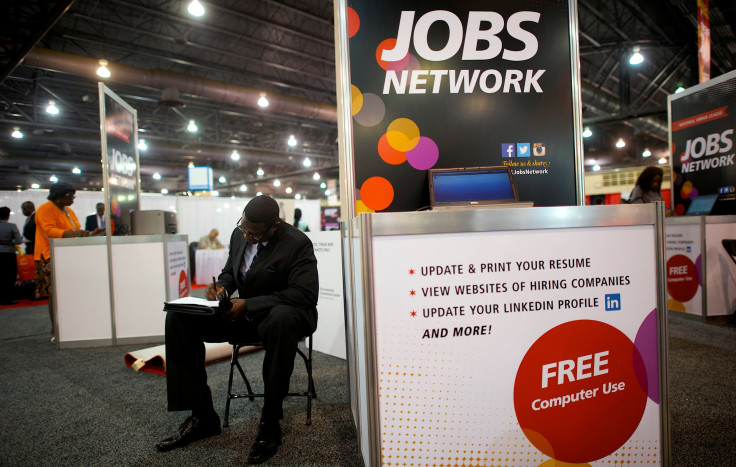US Economy 2018: Industrial Output Rises; Job Openings At Record High

WASHINGTON - U.S. industrial production increased for a fourth straight month in September, boosted by gains in manufacturing and mining output, but momentum slowed sharply in the third quarter.
Other data on Tuesday showed job openings hit a record high in August, far outpacing a rise in hiring, suggesting that companies were increasingly being starved of workers. There are concerns that the worker shortage, especially in manufacturing and construction industries, could hinder economic growth.
“Companies need more workers than the economy has to give and this is going to lead to a slowdown in economic growth somewhere down the road,” said Chris Rupkey, chief economist at MUFG in New York.
The Federal Reserve said industrial production rose 0.3 percent last month after increasing 0.4 percent in August. Economists polled by Reuters had forecast industrial output rising 0.2 percent in September.
Industrial production grew at a 3.3 percent annualized rate in the third quarter, decelerating from the 5.3 percent pace logged in the second quarter. The Fed reported a minimal impact to production from Hurricane Florence, which drenched South and North Carolina in mid-September.
Manufacturing output increased 0.2 percent in September, the smallest gain in four months, after rising 0.3 percent in August. A 1.7 percent increase in motor vehicle production helped to lift manufacturing output last month.
Motor vehicle production surged 4.3 percent in August. There were also strong increases in the production of primary metals, machinery and wood products last month.
The dollar was little changed against a basket of currencies, while U.S. Treasury yields rose slightly. Stocks on Wall Street were trading higher, boosted by upbeat earnings from blue-chip companies.
Manufacturing, which accounts for about 12 percent of the economy, is being supported by a strong domestic economy. Momentum is, however, slowing against the backdrop of a strong dollar and cooling global growth, which is restraining exports.
The dollar has this year gained about 6.2 percent against the currencies of the United States’ main trade partners.
While there are so far few signs the Trump administration’s “America First” policies, which have left the United States embroiled in a bitter trade war with China, are undercutting production, manufacturers having been increasingly complaining about disruptions to the supply chain.
MANUFACTURING SEEN WEAKENING
“The appreciation of the dollar and slowdown in global growth will weigh on the sector more heavily in the months ahead, so growth in manufacturing output still looks set to weaken from here,” said Michael Pearce, a senior U.S. economist at Capital Economics in New York.
Manufacturing output increased at a 2.8 percent rate in the third quarter after growing at a 2.3 percent pace in the April-June period. Mining production increased 0.5 percent in September, adding to the 0.4 percent rise in August.
Oil and gas well drilling, however, fell for a third straight month in September. Mining output grew at an 11.4 percent rate in the third quarter after notching a 16.5 percent pace in the second quarter. The sector has rebounded about 24 percent from its trough in 2016.
Utilities output was unchanged in September after soaring 1.1 percent in the prior month. A surge in natural gas output was offset by a decline in the production of electricity.
Capacity utilization for the industrial sector, a measure of how fully firms are using their resources, was unchanged at 78.1 percent. It increased to 78.0 percent in the third quarter, the highest level since the first quarter of 2015, from 77.8 percent in the April-June period.
The industrial production data strengthened expectations of strong economic growth in the third quarter. Growth forecasts for the July-September period are above a 3.0 percent annualized rate. The economy grew at a 4.2 percent rate in the second quarter. While strong growth is expected this year, the shortage of skilled workers is clouding the outlook.
In a separate report on Tuesday, the Labor Department said there were 7.14 million job openings in August. That was the highest level since the series started in 2000 and compared to 7.08 million vacancies in July.
The increase in vacancies was concentrated in the finance, business and professional services, and healthcare sectors.
The job openings rate also rose to an all-time high of 4.6 percent from 4.5 percent in July. Hiring increased to a record high 5.78 million in August from 5.71 million in the prior month. That lifted the hiring rate to 3.9 percent from 3.8 percent in July.
“We have never had an economy turn down because it ran out of labor, but in the next couple of years, this will be the biggest risk to the economy’s continued expansion,” said MUFG’s Rupkey. “The manufacturing industry needs 488,000 workers right now to help them produce goods for America.”
Reuters
Reporting By Lucia Mutikani; Editing by Andrea Ricci
© Copyright Thomson Reuters 2024. All rights reserved.





















